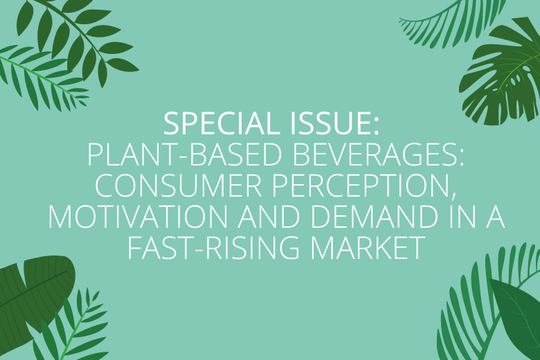Guest Editors
Sergio Rivaroli - sergio.rivaroli@unibo.it
Davide Giacalone - dg@iti.sdu.dk
Angel A. Carbonell-Barrachina - angel.carbonell@umh.es
Special issue information
The growing societal demand for a sustainable food system is also mirrored by individuals’ changing drinking and eating habits. Although, initially, vegan, vegetarian, and flexitarian diets have been considered a “fringe” population, the recently rising market for plant-based (PB) foods and beverages reflects the growing of individuals’ awareness of the potential health, wellness, and environmental benefits of a plant-based diet.
Plant-based milk alternatives (PBMAs) obtained from legumes (i.e., soybeans), cereals (i.e., rice and oats), nuts (i.e., almonds and hazelnuts) and other plants (i.e., hemp, coconut) are today almost as prevalent on supermarket shelves as dairy milk, representing a good alternative for addressing consumers’ health and environmental concerns, as well as for consumers with special dietary needs (e.g., lactose intolerance or allergy to milk proteins). PBMAs are also promising as an inexpensive alternative to consumers in developing countries where cow’s milk supply is insufficient.
Despite the increasing availability of PBMAs, several challenges may pose barriers to their adoption. Sensory acceptability is often a major challenge (e.g., in legume-based milk alternatives), as is their health-related image, since most PBMAs fall short compared to dairy milk in terms of nutritional balance. Concerted research efforts are required in the PBMAs to understand consumer needs and demands and develop new palatable and nutritionally adequate products.
Moreover, despite the rising market growth rate for PBMAs, less attention has been paid in the literature to studying consumer demand, needs, and behaviour for these milk alternatives than PB solid foods such as meat analogues. Thus, considering the differences between beverages and foods in terms of sensory properties and their role in eating habits, earlier results cannot be generalised.
Against this backdrop, this Special Issue of Beverages focuses on non-alcoholic PBMAs. It brings original studies and current review articles in sensory and consumer behaviour science fields to a broader understanding of the non-alcoholic PB beverages in the actual consumer diet.
Keywords
• Plant-based beverages
• Consumer research
• Consumer behaviour
• Food choice motivations
• Consumer lifestyle and food choices
• Hedonic and functional food choices
• Social and cultural aspects of food choice
• Nutritional and sustainability labelling
• Sensory and consumer science
Manuscripts should be submitted online at www.mdpi.com by registering and logging in to this website. Once you are registered, click here to go to the submission form. Manuscripts can be submitted until the deadline. All submissions that pass pre-check are peer-reviewed. Accepted papers will be published continuously in the journal (as soon as accepted) and will be listed together on the special issue website. Research articles, review articles as well as short communications are invited. For planned papers, a title and short abstract (about 100 words) can be sent to the Editorial Office for announcement on this website.

